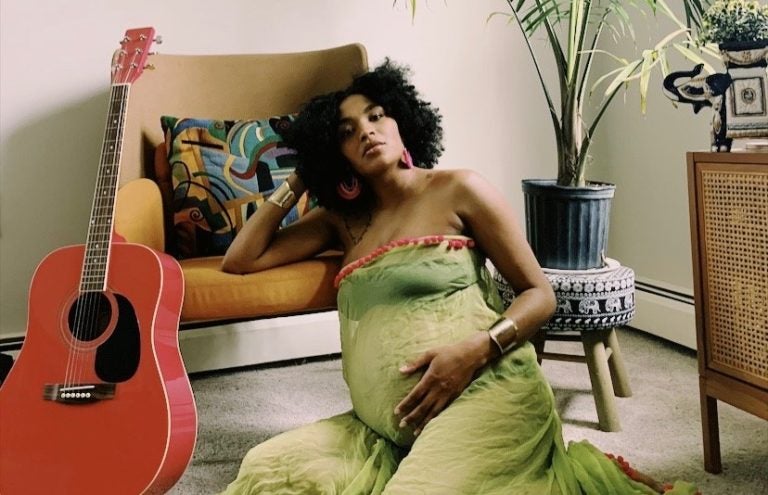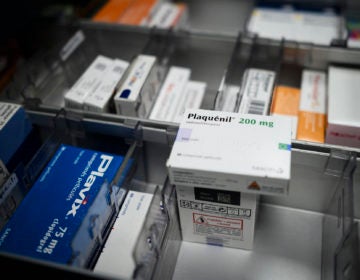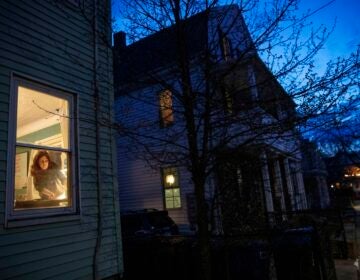COVID-19 brings ‘cataclysmic changes’ for people giving birth in Philadelphia area
With the pandemic, more are interested in home births, some ask for induced labor, and some are coming from New York to see about having babies here.

Najeemah Bailey. (Photo courtesy of Najeemah Bailey)
Najeemah Bailey is expecting her first child at the end of April. She had planned a baby shower, family and friends were going to visit from out of state.
None of that is happening now.
“It has been a bit of a low blow, but I’ve been just trying to keep spirits up, because at the end of the day, you just have to take things as they come.”
She’s been doing yoga, reading, and spending time with her partner to keep a positive outlook. But then she’s also had trouble getting baby supplies, even when it comes to necessities like diapers.
“People started to panic a lot when they said to stay in the house, so people started to buy up everything,” Bailey said.
Before the COVID-19 pandemic hit, Bailey had already planned a home birth and found a midwife, Asasiya Muhammad. There has been a sharp increase in demand for midwives and home births recently: Muhammad said that she usually gets five to eight inquiries a week, but last week she got around 10 inquires a day, and that’s what her fellow midwives are seeing as well.
“They start every statement with, ‘Because of what’s going on, I feel very afraid because I don’t think I’m going have enough support in the hospital, my hospital is saying that I can’t bring anyone, and also afraid I’m going to be exposed to COVID-19 if I go to the hospital.’”
Because of the coronavirus, hospitals are trying to limit the number of people who come through, which includes policies saying only one other person can be present during labor and delivery. For some people, that means choosing between a doula and a partner.
“That has led to cataclysmic changes in how we go about our business of obstetrics and gynecology,” said David Jaspan, chair of the OB/GYN Department at Einstein Healthcare Network.
Midwives spend time developing relationships and work with low-risk, healthy pregnancies, Muhammad said. So home births are not for everyone.
Usually, she said, she gets inquiries from people who have thought about home births, have researched midwives, and are just calling to find the best midwife for them. That’s happening less now.
“Some have even said, ‘Can I just call you when I’m in labor?’ Which is not what we do,” Muhammad said.
Those who plan to give birth at hospitals have been asking different questions, as well, because of the pandemic. For instance, quite a few have asked about having induced birth at 39 weeks, so they don’t have to wait for labor, according to Sindhu Srinivas, director of obstetrical services at Hospital of the University of Pennsylvania.
Delivering hospitals in the Philadelphia area have also gotten calls, or even just visits, from people as far away as North Jersey and New York City hoping to give birth here. Jaspan, at Einstein Health Network, said that as of Tuesday there were eight patients from New York City. He said the hospitals don’t want to accept out-of-state patients in their third trimester because of the community spread of COVID-19 in New York and a two-week travel advisory for anyone living in New York issued by the Centers for Disease Control and Prevention.
“The problem that we have is when they present in the office,” Jaspan said. “It’s hard to turn somebody away, because you want to provide care but you also have to protect your staff and our patients, and it really creates a difficult dilemma.”
“It’s a terrible situation because the patient is truly caught in the middle,”Jaspan said. “And the patient is not doing this with any malicious intent, no harm, just fear, trying to do the best that they can to take care of themselves and their baby, and we’re trying to do the same for our patients here.”
Several hospitals here also have people who are pregnant and test positive, or show symptoms of COVID-19. It’s still unclear how the new coronavirus affects those who are pregnant specifically, but their immune systems are somewhat suppressed, which is why they have a higher risk of getting ill from other coronaviruses or the flu, said Vincenzo Berghella, director of the Division of Maternal-Fetal Medicine at Thomas Jefferson University.
That’s why his department and its counterparts in the area are taking this issue so seriously, Berghella said — even if it comes to making difficult decisions such as limiting the number of visits before labor. They are also contributing to a nationwide study of pregnancies involving COVID-19 at the University of California, San Francisco to better understand how the disease affects this particular group.
WHYY is your source for fact-based, in-depth journalism and information. As a nonprofit organization, we rely on financial support from readers like you. Please give today.





![CoronavirusPandemic_1024x512[1]](https://whyy.org/wp-content/uploads/2020/03/CoronavirusPandemic_1024x5121-300x150.jpg)


